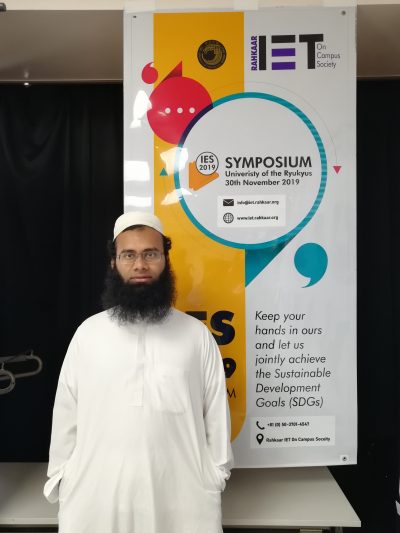This time Scientific Bangladesh has interviewed Hasan Masrur. He is a passionate researcher and pursuing PhD in

Japan. He has shared many helpful tips for future PhD students. Here is what he says:
1.Scientific Bangladesh: Please briefly introduce yourself, your PhD topic, and your University to our readers.
Hasan Masrur: Since 2019, I am pursuing my PhD under the Interdisciplinary Intelligent Systems Engineering program at the University of the Ryukyus, located at the beautiful Okinawa prefecture of Japan. I belong to the Power & Energy System Control lab (Senjyu Lab). My research interests are in the areas of Renewable and Sustainable Energy, Microgrid, and Smart Grid, particularly, I am working on the optimization and techno-economic analysis of renewable energy-based Microgrid. Prior to joining U of Ryukyus, I earned a Master’s Degree in Energy from the Asian Institute of Technology (AIT), Thailand in 2017. I am awarded full funded scholarship for both my PhD ( MEXT) and Masters (HM Queen, Thailand) programs. I am actively working with academia and industry on different research projects and open to research collaborations from potential researchers.
2.Scientific Bangladesh: What has made you have gone for PhD? In other words, why are you pursuing for PhD?
Hasan Masrur: Well, during my Masters I was introduced to the ‘world’ of research. I guess, since then I grew a passion for research and explore new ideas. But you need a platform to grow and validate your ideas and then share with your peers. So, when I was offered a PhD position, I didn’t hesitate to accept.
3.Scientific Bangladesh: How did you choose your i)PhD topic and ii) Institute?
Hasan Masrur: Actually, I extended my Master’s work to the PhD. As for the Institute, I contacted the Professor of my current lab because my research areas are completely aligned with him.
4.Scientific Bangladesh: What is the minimum qualification in your university to get admission as PhD student, Bachelor or Master’s degree?
Hasan Masrur: For PhD: Masters with IELTS score; Master: Bachelor with IELTS; Bachelor: I am not sure, updated info is available on the university website.
5.Scientific Bangladesh: If anyone wants to do PhD in your University/country, what are the steps one has to follow?
Hasan Masrur: Please contact the prospective supervisor and study about the intended lab, I mean, find out about the research facilities, publication frequency and quality, professor’s personality, future job prospects of the graduate students, and so on. Email the current members, if necessary. Please take an IELTS exam and score 6+. Prior publication(s) and decent CGPA is always a plus. Here in Japan, mainly MEXT (University/Embassy recommendation) scholarships are available to the Bangladeshi students. One may self-sponsor and later apply for scholarships for the privately financed students.
6.Scientific Bangladesh: What are mistakes one should avoid when contacting with University or Professor for PhD studentship?
Hasan Masrur: Please don’t ask for the scholarship/financial support at the very first email, try to be brief as much as possible, skip the general formatted email, and most importantly don’t get frustrated if there is no response (you may send them a follow-up email though), try other professors.
7.Scientific Bangladesh: How will you get PhD, by submitting a thesis or publishing a certain no of publications(journal articles)?
Hasan Masrur: Publishing a certain number of quality journal articles.
8.Scientific Bangladesh: Did you deliberately choose your Supervisor? What were your criteria for choosing PhD supervisor?
Hasan Masrur: Yes. The main criteria were: same research field, publication frequency, and quality and lab member
9. Scientific Bangladesh: What is your key to maintaining a good relationship with your supervisor?
Hasan Masrur: Well, for my case, publishing articles regularly never fails to a put smile on his face. Hard work
always pays off.
10.Scientific Bangladesh: What principle do you follow to maintain a good relationship with your labmates?
Hasan Masrur: Interesting question! We enjoy our little chats, respect each other’s privacy, and make research collaboration…
11.Scientific Bangladesh: Doing PhD is a stressful job? How do you manage or release stress?
Hasan Masrur: Spending time at the Masjid, Prayers always release our stress. Taking quality family time always works in this regard.
12.Scientific Bangladesh: How many days in a week you go to the lab? Why?
Hasan Masrur: Almost every day- I am a passionate researcher 😛
13.Scientific Bangladesh: PhD is considered as training for a career in Research. What 1. technical and 2. Soft skills you are focusing to develop or developed by this time?
Hasan Masrur: I have published three journal articles and four conferences proceeding since I started my PhD in October 2019. So, I guess, I have developed article writing skills. The co-authors are from five different countries- that’s networking and collaboration skills, I think. I intend to learn Python and other useful tools for Power system analysis
14.Scientific Bangladesh: What is your future plan? Want to go back to Bangladesh or not?
Hasan Masrur: Being a research professor is primary my intention, so I will try fulfilling that wherever I get the opportunity, be it in Bangladesh or any other country. Muslim majority countries are first preference though.
15.Scientific Bangladesh: What are your suggestions for prospective PhD students?
Hasan Masrur: Follow your passion, keep in touch with the researchers of your field. Do your best and always ask for Allah’s assistance. Indeed, Allah is the best provider.
16.Scientific Bangladesh: Would like to share your weekly story with other PhD students? If yes, register at www.scfbd.net
Hasan Masrur: Yes
Scientific Bangladesh: Thank you for your intention to write regularly in Scientific Bangladesh. Our readers will be waiting for your weekly writing.
